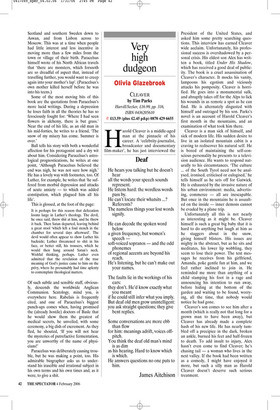Very high dudgeon
Olivia Glazebrook
CLEAVER by Tim Parks Harvill/Secker, £16.99, pp. 316, ISBN 0436205610 ✆ £13.59 (plus £2.45 p&p) 0870 429 6655 Harold Cleaver is a middle-aged man at the pinnacle of his career. A ‘celebrity-journalist, broadcaster and documentary film-maker’, he has just interviewed the President of the United States, and asked him some pretty searching questions. This interview has earned Cleaver wide acclaim. Unfortunately, his professional success is overshadowed by a personal crisis. His eldest son Alex has written a book, titled Under His Shadow, which has received a good deal of publicity. The book is a cruel assassination of Cleaver’s character. It mocks his vanity, lampoons his egotism and viciously attacks his pomposity. Cleaver is horrified. He goes into a monumental sulk, and abruptly takes off for the Alps to lick his wounds in as remote a spot as he can find. He is alternately disgusted with himself and outraged by his son. Parks’s novel is an account of Harold Cleaver’s first month in the mountains, and an examination of what took him there.
Cleaver is a man sick of himself, and sick of modern life. His sudden desire to live in an isolated mountain cabin is a craving to rediscover his natural self. He is bored of maintaining the self-conscious personality he presents to a television audience. He wants to respond naturally to his circumstances. ‘The culture ... of the South Tyrol need not be analysed, ironised, criticised or eulogised,’ he tells himself as he sets off for Gatwick. He is exhausted by the invasive nature of his urban environment: media, advertising, commerce — all are inescapable. But once in the mountains he is assaulted on the inside — inner demons cannot be evaded by a plane trip.
Unfortunately all this is not nearly as interesting as it might be. Cleaver himself is such a great big baby that it is hard to do anything but laugh at him as he staggers about in the snow, giving himself blisters. His issues are mighty in the abstract, but as he sits and meditates, his lower lip wobbling, they seem to lose their power. The text messages he receives from his girlfriend, Amanda, poke gentle fun at him, and we feel rather inclined to join in. He reminded me more than anything of a child stamping his foot in a rage and announcing his intention to run away, before hiding at the bottom of the garden and waiting to be found, worrying, all the time, that nobody would notice he had gone.
Cleaver’s son comes to see him after a month (which is really not that long for a grown man to have been away), but Cleaver has already made a complete hash of his new life. He has nearly tumbled off a precipice in the dark, broken an ankle, burned his feet and half-frozen to death. To add insult to injury, Alex hasn’t even come to find Cleaver; he’s chasing tail — a woman who lives in the next valley. If the book had been written as a comedy, I might have enjoyed it more, but such a silly man as Harold Cleaver doesn’t deserve such serious treatment.





























































































































 Previous page
Previous page